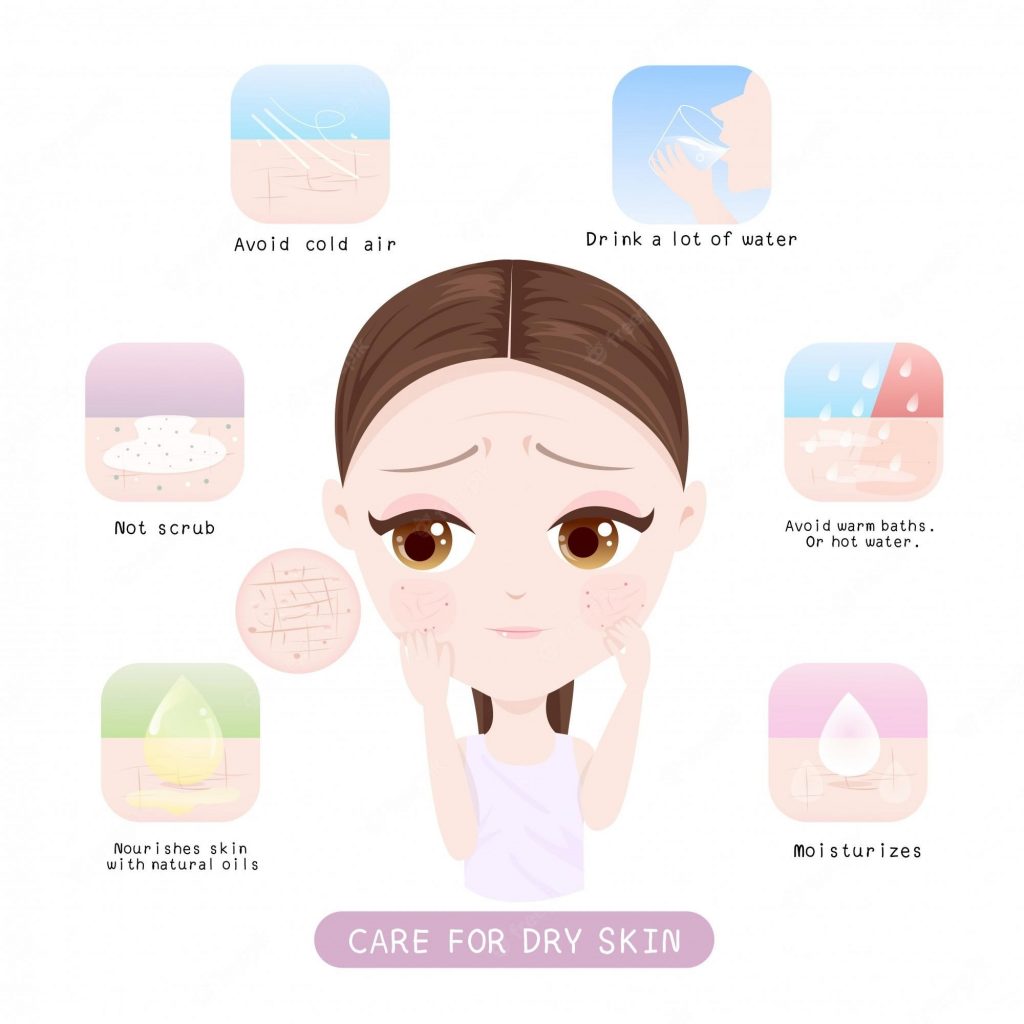
Did you know that there are over 200 different types of dry skin? And no, it’s just confined to the cold and dry winter season. In fact, people with very oily skin can also experience an abundance of dry skin. Everyone has dry skin from time to time, usually in response to seasonal changes, stress or irritation from other products. But for those with persistent and severely dry skin, it becomes a daily ritual – one that’s not so easy to ignore or put off any longer. While many of us tend to treat our skin as an afterthought—an unfortunate but unavoidable side effect of a busy life—the reality is that your skin deserves just as much attention as the rest of your body.
What Causes Dry Skin?
Dry skin is naturally more sensitive than other skin types and doesn’t contain enough oil to keep it moisturized—so it will naturally lose moisture and start to crack, flake and itch if not treated accordingly. Where you live, the water you drink, what kind of soaps and lotions you use, and the climate you live in are all contributing factors to the health of your skin. As we age, our skin naturally loses elasticity and becomes thinner, drier and more susceptible to UV damage. Young skin can produce oils that keep it moist, while as we age, we struggle to produce enough of these oils to keep our skin hydrated. This can make dry skin a chronic condition. Your skin’s condition can also be affected by diet, stress and hormonal changes. Dry skin is extremely common when you transition into menopause.
How to Recognize Dry Skin
If you’re not sure whether you have dry skin, you can use the following simple checklist to determine whether you should take extra care of your skin. Looking at your skin under a magnifying mirror can help you identify flakes and/or flaking. If you find that you have a lot of dead skin, you may have dry skin. If you’ve recently changed your skincare routine, or are experiencing a lot of stress, these can also be contributing factors to dry skin. If your skin feels tight, it’s probably dehydrated and in need of some extra TLC.
Tips to Treat Dry Skin
– Moisturize twice a day – Your first line of defense against dry skin is regular and ample hydration. Although the precise amount of hydration varies depending on the individual, most dermatologists recommend moisturizing twice daily, in the morning and before you go to bed at night.
– Wear soft fabrics and avoid excess heat – Avoid wearing excessive clothing that might irritate your skin and opt for soft fabrics like cotton instead. When you can, try to stay indoors and out of extreme temperatures and wind. Excessive heat and sun exposure can severely dry out your skin and increase your risk of skin cancer.
– Use gentle, fragrance-free products – Look for products that are labeled hypoallergenic, fragrance-free and non-drying. When searching for a new skincare product, check the ingredients to see if you recognize all of them. If you don’t, you may want to avoid that product.
– Schedule a professional skin consultation – If your dry skin condition is severe and/or chronic, a dermatologist may be able to offer additional advice on how to best treat it and prevent it from coming back. For example, they may recommend prescription strength creams and ointments that treat the root cause behind your dry skin or recommend lifestyle changes that you can make to prevent your skin from drying out again.
Natural Oils to Combat Dry Skin
Jojoba Oil – This is a natural plant oil that mimics your skin’s sebum, fighting against bacteria and inflammation that can cause irritation and lead to more severe skin conditions.
– Rosehip Oil – Derived from a rose plant, this oil is rich in antioxidants that help reduce and prevent signs of aging, such as wrinkles. It also provides intense hydration, helping to reduce the appearance of fine lines and wrinkles while promoting a healthy glow on your cheeks.
– Coconut Oil – This natural oil is great for all skin types and can be used as a daily moisturizer, as well as a treatment for other skin conditions such as eczema and psoriasis.
– Safflower Oil – This oil is rich in Vitamin E, a powerful antioxidant. It’s also rich in oleic acid, which is great for preventing the signs of aging and protecting your skin from UV damage.
– Avocado Oil – This oil is full of essential fatty acids that hydrate your skin, promote collagen production and increase blood flow to your skin. It’s a light oil that can be used on all skin types, particularly sensitive and pregnant skin.
Aromatherapy for Dry Skin
Certain scents can help hydrate your skin, calm inflammation and reduce your body’s production of cortisol, a stress hormone that can exacerbate dry skin. These include:
– Basil – Basil has anti-inflammatory properties, which can be very soothing on dry skin. It’s also a great tonic for your skin: it boosts circulation, stimulates collagen production, and helps protect against UV damage.
– Chamomile – Chamomile contains compounds called flavonoids, which have anti-inflammatory properties that can help soothe irritated skin. Chamomile also contains coumarin, which has been shown to be effective against the bacteria that can trigger dry, flaky skin.
– Cinnamon – Cinnamon has strong antibacterial properties, which can prevent and treat bacterial infections that lead to dry, flaky skin.
How to Build a Good Skin Care Routine for Dry Skin
When treating your dry skin, it’s best to start with clean and fresh skin. Remove all makeup and dirt before bed with a gentle cleanser that won’t strip your skin of its natural oils. When you wake up, wash your face again with a cleanser that moisturizes and prepares your skin for the day ahead. Use a gentle moisturizer and wear sunscreen, even on cloudy days, to shield your face from additional UV damage. Throughout the day, regularly use a hand cream to keep your hands and nails hydrated and protected. Finally, before you go to bed, apply a gentle moisturizer. If your skin is severely and chronically dry, you may also want to consider switching to a less drying cleanser and/or trying a topical treatment, such as a moisturizer with SPF or a prescription-strength cream.
Conclusion
Keeping your skin healthy isn’t just about looking good—it has a range of important functions that keep us safe. The skin is our body’s first line of defense against external elements and pathogens. It’s important to keep your skin hydrated and moisturized to promote a healthy complexion. Be sure to drink lots of water throughout the day to stay hydrated and nourish your skin. Using these tips and products, you can help keep your skin hydrated and healthy!


Leave a Reply